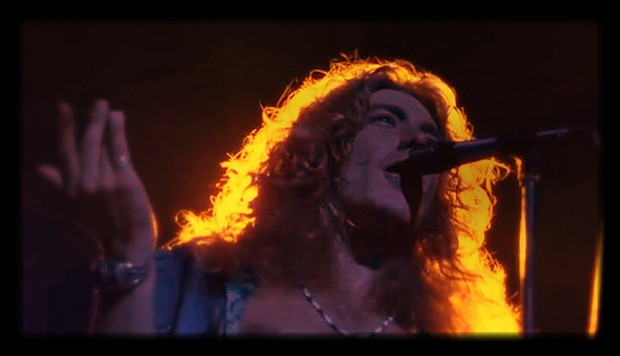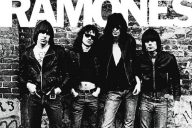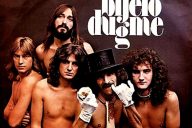My first exposure to the Gods of Rock was the Robert Plant poster in my stepbrother’s bedroom. It must have been about 1980, my brother was 16 or 17. He played bass in a high school rock band. I think they did a few Led Zeppelin covers.
The poster had an iconic look, as in the religious sense of the word. Not that I really knew what “iconic” meant at the time. But the image spoke in a language both exotic and authoritative, and I’d think about it years later, going through my teen punk phase, with a certain degree of disdain. Then grunge came along and it was alright to like Led Zeppelin again. (However, at least in US alternative rock terms, there were moves in the early/mid 80s towards Led Zep rehabilitation with the Butthole Surfers LP/ode to the band Hairway to Steven, and the likes of late-period Black Flag and early-period Bad Religion opened some ears to classic 70s rock sounds.)
From memory, the poster had Plant in tight denim jeans and an open denim shirt, sandy blonde trestles cascading down onto his shoulders. It had a radiant sepia glow; the spotlight giving Plant a hagiographic tan. I had no idea what it all meant as an eight-year-old whose favourite song at the time was the Trini Lopez rendition of “If I Had a Hammer” — weird kid.
As younger brothers tend to do, I hung around with the older kids, absorbing the knowledge, picking up on the cues and signals of teenage life. A big part of all this were the debates and discussions about which band was the greatest in the world: Led Zeppelin, Black Sabbath, Queen. Who was the best guitarist: Jimmy Page, Tony Iommi, Brian May. The coolest singer: well really there was no debate, it was almost universal consensus that it was Plant. Ozzy Osbourne and Freddie Mercury received their due, Rainbow-period Ronnie James Dio got some love, Deep Purple’s Ian Gillan got a nod, and god forbid, Paul Stanley of Kiss even made the shortlist thanks to the intransigence of the KISS Army bloc. (Even though, strictly speaking, he was also a rhythm guitarist.)
The KISS Army bloc consisted of the two brothers who lived next door to us, both paid-up and official Knights In Satan’s Service. We’re talking crazed, maniac, posters-covering-the walls-and-ceilings,wear Gene Simmons make-up in public type fans. But even they mostly conceded that Plant was the Zeus among the pantheon of great rock vocalists.
(The KISS brothers, Cerd aka “Merm” and Jerry Sauzier, soon became rusted on “headbangers”. They were the first guys I knew who were into the underground tape trading scene and listened to thrash bands like Kreator, Sodom and Metallica. They started a band called No Remorse, which morphed into Persecution, who used to play around Melbourne in the mid-80s with the likes of Hobbs Angel of Death and Mortal Sin, I think. Another one of the guys in our street, also part of the neighbourhood rock appreciation club, went on to play guitar in Melbourne new romantic band Kids in the Kitchen!)
That Plant poster came back to me because I’ve been listening to the 40th anniversary edition of Led Zeppelin’s Physical Graffiti album. It led me to ponder the near total disappearance of the god-like front man in rock music today.
The lead singer: as in the vocal conduit of the sounds made by the guys with the instruments; the squealing, writhing shaman/showman magus cavorting like a demented whore of Babylon; the lightning rod for teen adoration and adult opprobrium; the Plymouth “Flying Lady” hood ornament atop a sleek, muscle car engine. The man in the band with no instrument but his larynx and a lascivious wink.
The truth is that the Age of Rock is over, we’re now just picking over the entrails. That doesn’t mean there aren’t still great rock bands around; they’re around but their cultural significance is nowhere near that of the Baby Boomer era bands from the 1960s through to the late 1980s — truly the Golden Age of Rock. (As well as being the “Golden Age of Leather”, according to Blue Oyster Cult. But the “Golden Age of Rock ‘N’ Roll’, now that was the 1950s, so sayeth Mott the Hoople.)
Grunge was rock music’s last enervated gasp at big picture relevance. In front man terms, grunge (and variant forms) gave us Chris Cornell of Soundgarden, Eddie Vedder of Pearl Jam, Zach de la Rocha of Rage Against The Machine, Layne Staley of Alice in Chains, Scott Weiland of Stone Temple Pilots, Pantera’s Phil Anselmo, Henry Rollins — all pretty tortured, earnest characters. I’m not counting Kurt Cobain because he was a guitarist as well as vocalist. We’re talking exclusively about mic handlers here. (Yeah, I know, Chris Cornell played some guitar, but you know…)
The 90s also gave us Anthony Kiedis, for which it is truly sorry…
The closest Britpop could come to producing a fire-breathing sex beast vocalist of yore was Liam Gallagher of Oasis, which in the context of comparison to Robert Plant is sort of like comparing a decent pub meal to a medieval banquet of slaughtered swans, wild boar and gilt sugar-plums.
I won’t talk about Jarvis Cocker or Damon Albarn because Pulp and Blur were not rock bands. I repeat, NOT ROCK BANDS. Same with Morrissey and the Smiths. So don’t bother me.
In terms of rock music’s evolution, we’re in similar territory to when Wynton Marsalis led his neo-classicist crusade to preserve “pure jazz” in the 1980s. Drawing historicist parallels can be misleading, but the timelines fit (in an angry three-year-old jamming jigsaw puzzles in any which way kind of way): jazz was 60 years or so on from the pioneering days of Louis Armstrong’s Hot Five and had been through a series of revolutions and evolutions before Marsalis thought sanity and order had to be restored to save jazz from eating itself; tracing its genesis back to its immediate pre-Elvis rock ‘n’ roll roots (late 40s jump/early 50s jive), rock music is also 60 or more years into its evolutionary path. Jazz music’s watershed was the free jazz movement of the mid-60s, while rock music’s great shakeout was punk rock; both musical forms have been trying to work out what the hell happened ever since.
Hell, even hip-hop scholars concede its Golden Age has been and gone, pointing to the late 1980s/early 90s as the period in which the genre peaked in artistic terms. Its cultural relevance is more pervasive now than that of rock music, but in a similar fashion to when jazz went electric/fusion/world in the late 1960s, and when rock had its punk implosion and reconfigured itself for corporate rebirth in the 1980s, hip hop has now moved beyond its classic stage — NWA, De La Soul, Run DMC, Boogie Down Productions et al — and is in a rapid rate of sonic expansion until, like all universes, it stretches beyond its gravitational constituent parts and does a Big Crunch, collapsing into black holes in a manner similar to both jazz and rock. (As foretold by The Roots in their 1999 album Things Fall Apart.)
So the Age of Rock is over but we continue to inhabit the black holes of its contracted and diminished relevance. As do rock’s front men. The spotlight has been turned off, the roadies have packed up and there stands a man in crotch-hugging black leather pants and a loose, cheesecloth pirate’s shirt unbuttoned to the waist, practising his scales and clutching his mic stand like it’s Maria Schneider in Last Tango in Paris. The cleaning staff of the multifunction sports arena take out the papers and the trash. No need to clean up discarded lighters anymore, we’ve got smartphones to hold aloft at concerts now.
What we’re talking about is the old-fashioned front man; the guy who invested the music with the all-important “Majesty of Rock, the Fantasy of Roll”. Goddammit!
These emblematic front men give us a neat timeline/story arc for the capsulated history of rock music as culturally relevant product: Mick Jagger, Jim Morrison, Robert Plant, David Lee Roth and Axl Rose. Right there with those five you have the ascent, apex, stasis, decline and nadir of the lead vocalist as talismanic relic of the Rock Era.
Mick Jagger took the rooster strut of the blues for a walk down London’s swinging Carnaby Street. He was a street fighting man and British dandy all in one. He couldn’t get no satisfaction because he was young, hungry and aspirational. Who the fuck is Mick Jagger, indeed.
Jim Morrison combined sex appeal, rebellion and poetic ramblings to give rock music its deep, brooding and dangerous poet-in-residence. The Doors, along with all the other bands of the late 60s that took the music into a more adult-oriented direction, gave rock the necessary gravitas to keep its audience interested beyond the bounds of pop novelty.
Robert Plant stood atop the Mt Olympus of rock’s epic flowering into pomp and majesty. Led Zep took the blues to its most baroque point, holding back on the progressive noodlings that often effectively castrated the sexuality of the music — I love Yes, but they don’t make sexy music. Led Zep does. Whether the punks liked it or not, Led Zep represents the peak expression of rock music.
David Lee Roth was out the front of some hyper-warp time machine sci-fi rocket powered by the insane Van Halen brothers, along with Michael Anthony holding down time in order to keep the whole concept barely believable as a form of rock music. “Diamond Dave” was over the top, camp, kitsch and he more often than not gave the audience a nod and a wink that all this you see before you, well, it’s a bit of a cosmic joke. In a certain sense, DLR seemed to know the rocket was about to explode but why not have a good time before being blown to smithereens?
Axl Rose was angry. He worked his skinny ass off in the 80s to become a big star with Guns N’ fucking Roses. And he was a big, big star. Then a bunch of shit happened: grunge, hip hop, his bandmates leaving because he was a tyrannical loony. He was the last of the truly charismatic rock front men. The voice of a white male culture that was seeing its ‘rockist’ stranglehold on popular music being eroded by shit like political correctness, feminism, black people, homosexuals and cardigan-wearing sad sacks like Kurt Cobain. Axl Rose now lives in a black hole. Postcode: wrong side of history.
That Robert Plant poster on the wall of my stepbrother’s room opened a strange portal for me. I still don’t really understand the black hole I jumped down. The Gods of Rock float in space, suspended in time. The iconography still wields power but the culture around it has moved on. Like toppled statues of dictators in a museum, the great front men of rock live on in the shadow of our memories.

















Even as a once unrepentant Mike Patton fanboy, few are the rock lead singers these days not only with godly and hedonistic aura, but also that ‘mothers lock up your daughters’ vibe.